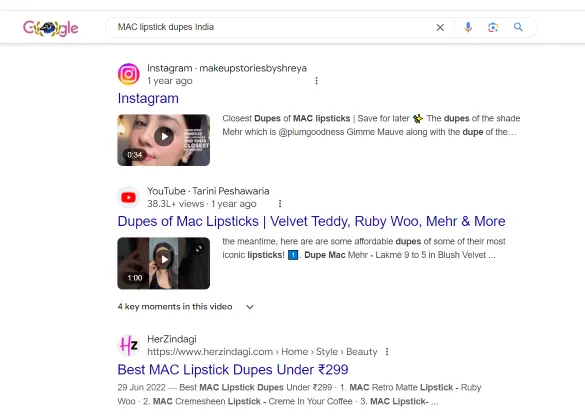
Have you ever noticed how some brands seem to follow you around the internet? You see their ads on Instagram and then — their website also appears in your Google search results while you are trying to look for related information.
It’s not a coincidence – it’s the powerful combination of SEO (Search Engine Optimisation) and social media.
A digital marketing agency sometimes uses SEO and social media together so that the brand shows up on every platform and users become more familiar with the brand.
The purpose is to show up on every platform so that users become familiar with the brand.
If you’re wondering how to implement this yourself — you have come to the right place.
In this blog, we will tell you how to combine SEO and social media to increase brand awareness.
But let’s first understand why you should use it together.
Table of contents
- The Why Behind Using SEO & Social Media Together
- How to Integrate SEO and Social Media
- In Conclusion
- Frequently Asked Questions
The Why Behind Using SEO & Social Media Together
You spot an engaging Instagram reel about an investment app like Groww. Intrigued, you want to know more, so you search for reviews on Google.
If Groww shows up prominently in both places – the Instagram reel and Google search – your confidence in the app grows. This is the magic of integrating SEO with social media: it increases your brand’s visibility across multiple touchpoints, enhancing recall and trust.
Here’s why you should use SEO and social media together.
1. Amplifying Content Reach
Social media platforms are fantastic for spreading your content to a wide audience. When you share blog posts, videos or articles on social media, you’re not just reaching your current followers. If your content resonates, it can be shared further, exponentially increasing its reach.
This wider exposure can drive more visitors to your website, which can lead to more backlinks. Backlinks – when other sites link to your content – are crucial for SEO because they signal to search engines that your content is valuable.
For instance, say you publish a comprehensive guide on jewellery styling. You can share it across Facebook, Instagram and Twitter with a direct link to your blog. The more people visit your site through these platforms, the better it supports your SEO efforts.
2. Enhancing Brand Recognition
Brand recognition plays a crucial role in both SEO and social media.
The more your audience interacts with you on social platforms, the more familiar they become with your brand. And when people start searching for your brand directly on Google, it boosts your search engine rankings.
For example, if your brand consistently posts useful content on Instagram, Facebook and Twitter, users are more likely to remember you and search for your products when they need something you offer. This increased brand recognition can directly influence how your brand ranks in search results.
3. Driving Targeted Traffic
Social media can be a powerful driver of targeted traffic to your website. By crafting engaging and relevant posts, you can attract users who are genuinely interested in what you offer.
This targeted traffic is valuable because it leads to higher engagement rates and, ultimately, more conversions. Additionally, if your website is optimised for SEO, this influx of targeted traffic can further enhance your search engine rankings.
Suppose you’re running a social media campaign to promote a new collection.
By targeting users who are interested in the topic, you can drive them to a landing page where they can download a discount coupon. They can use this coupon to get an in-store discount.
As there’s a reward, more people will visit your website which will tell Google that this website is valuable.
Hence get your website SEO optimised with the help of an SEO company.
4. Gaining Valuable Insights
Social media platforms offer a wealth of data about your audience’s preferences and behaviours.
This information can be incredibly useful for refining your SEO strategy. By analysing which types of content generate the most engagement on social media, you can identify trending topics and keywords that resonate with your audience.
This insight allows you to create content that is more likely to rank well in search engines.
For instance, if your social media analytics show that posts about sustainable fashion are receiving high engagement, you might want to focus on this topic for your next blog post or SEO campaign.
By aligning your content with what your audience is interested in, you enhance both your social media and SEO efforts.
How to Integrate SEO and Social Media
Now that we’ve covered why integrating SEO and social media is essential, let’s delve into practical tips for making it happen.
1. Synchronise Your Content Strategy
Creating a content calendar is key to synchronising your SEO and social media efforts. Plan and schedule your content so that it aligns with both SEO goals and social media promotions.
For example, if you’re planning to release a new product, schedule blog posts and social media campaigns around the same time.
This will amplify your reach because now you are connecting with an audience at multiple touchpoints.
2. Optimise Social Media Profiles
Your social media profiles should be optimised with relevant keywords and phrases. This not only helps with search visibility on social platforms but also reinforces your SEO strategy.
For example, if you’re a jewellery brand — include keywords like “gold jewellery” in your profiles, posts and descriptions.
If your brand profile is optimised, users searching for related services or topics can find you easily on social media.
Now your brand reel can also show up in search results. So try to include keywords in the captions as well.

3. Leverage Paid Social Media Ads
Paid social media ads can complement your SEO strategy by targeting specific audiences and driving targeted traffic to your site.
Use ads to promote products or special offers. For example, if you’re launching a new product, run targeted ads on Facebook or Instagram to drive traffic to your product page.
Paid ads can also help you reach users who may not have discovered your brand through organic social media or search engine results. By combining paid ads with your organic efforts, you can maximise your reach and impact.
Amazon uses this strategy.
Amazon uses a strategic blend of SEO and social media to boost its visibility. They promote their products through social media ads and posts, driving targeted traffic to their product pages.

Amazon’s SEO efforts ensure that these product pages rank well for relevant search terms, making it easy for users to find and purchase products.
This integration enhances Amazon’s brand presence and drives significant online sales.
In Conclusion
SEO and social media are powerful on their own, but when combined, they become a force multiplier for your brand’s online presence.
Imagine your brand showing up everywhere your potential customers are—on their Instagram feed, in Google search results and even on YouTube. The more touchpoints you create, the more you stay at the top of your mind, driving not only awareness but real conversions.
But remember, it’s not about dominating every platform at once but about connecting your efforts strategically. Whether it’s synchronising content, optimising profiles or running targeted ads, these tactics ensure that your brand gets seen, remembered and trusted.
And when SEO and social media work in harmony, the results speak for themselves: increased traffic, better rankings and a loyal audience that’s eager to engage with your brand.
So, if you’re ready to take your brand to the next level by combining these two powerhouse strategies, now is the time to act.
Thank you for reading this blog till the end. We regularly post blogs on all things digital. If you are interested in reading more, click this link



